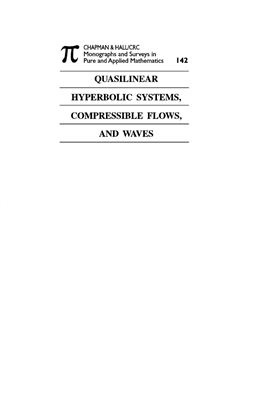CRC Press, 2010. - 282 pages.
Filled with practical examples, Quasilinear Hyperbolic Systems, Compressible Flows, and Waves presents a self-contained discussion of quasilinear hyperbolic equations and systems with applications. It emphasizes nonlinear theory and introduces some of the most active research in the field.
After linking continuum mechanics and quasilinear partial differential equations, the book discusses the scalar conservation laws and hyperbolic systems in two independent variables. Using the method of characteristics and singular surface theory, the author then presents the evolutionary behavior of weak and mild discontinuities in a quasilinear hyperbolic system. He also explains how to apply weakly nonlinear geometrical optics in nonequilibrium and stratified gas flows and demonstrates the power, generality, and elegance of group theoretic methods for solving Euler equations of gasdynamics involving shocks. The final chapter deals with the kinematics of a shock of arbitrary strength in three dimensions.
With a focus on physical applications, this text takes readers on a jouey through this fascinating area of applied mathematics. It provides the essential mathematical concepts and techniques to understand the phenomena from a theoretical standpoint and to solve a variety of physical problems.
Filled with practical examples, Quasilinear Hyperbolic Systems, Compressible Flows, and Waves presents a self-contained discussion of quasilinear hyperbolic equations and systems with applications. It emphasizes nonlinear theory and introduces some of the most active research in the field.
After linking continuum mechanics and quasilinear partial differential equations, the book discusses the scalar conservation laws and hyperbolic systems in two independent variables. Using the method of characteristics and singular surface theory, the author then presents the evolutionary behavior of weak and mild discontinuities in a quasilinear hyperbolic system. He also explains how to apply weakly nonlinear geometrical optics in nonequilibrium and stratified gas flows and demonstrates the power, generality, and elegance of group theoretic methods for solving Euler equations of gasdynamics involving shocks. The final chapter deals with the kinematics of a shock of arbitrary strength in three dimensions.
With a focus on physical applications, this text takes readers on a jouey through this fascinating area of applied mathematics. It provides the essential mathematical concepts and techniques to understand the phenomena from a theoretical standpoint and to solve a variety of physical problems.

